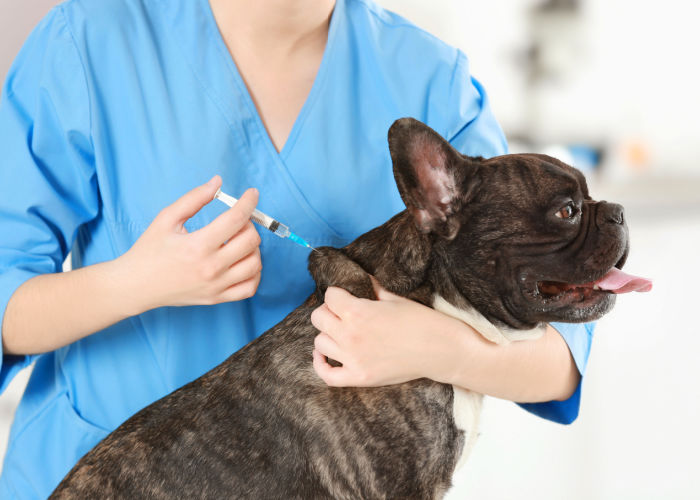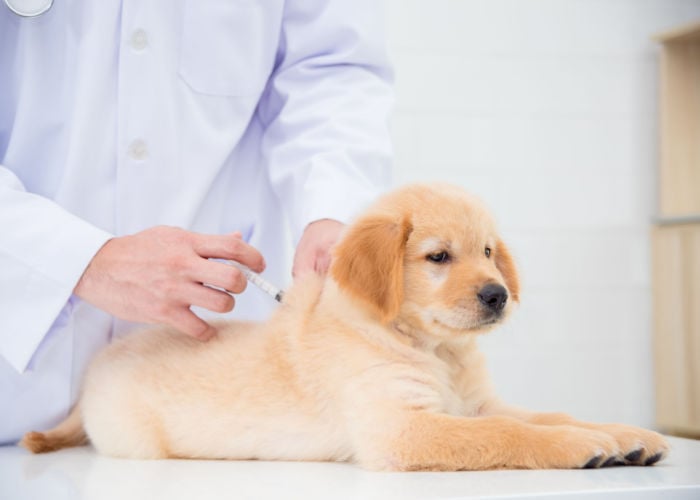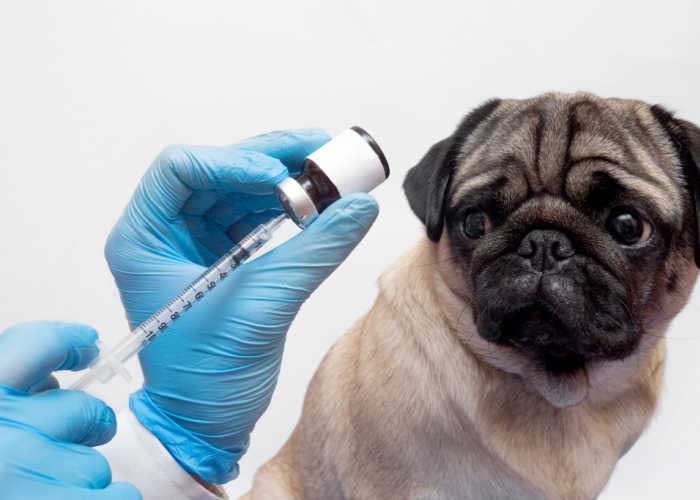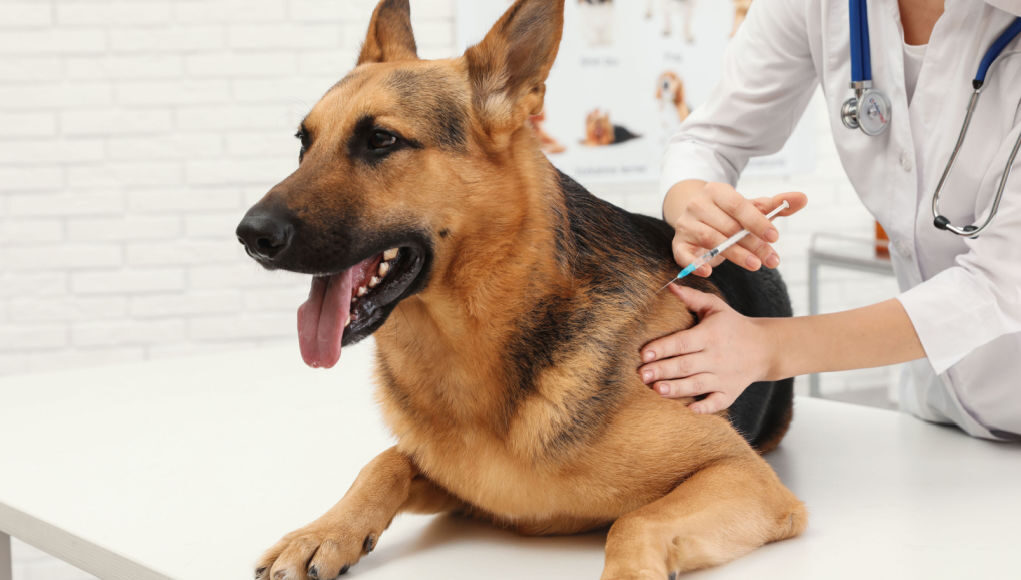Table of Contents
- Vaccinating Your Dog: Why Do Dogs Need Vaccinations?
- When Should I Vaccinate My Dog?
- What Happens if I Don’t Vaccinate My Dog?
- What Happens If I Vaccinate My Dog Late?
- How Much Do Vaccinations Cost?
- Are There Any Side Effects of Vaccines?
- What is Titre Testing and Is It The Same As Vaccines?
- Vaccinating Your Dog: Conclusion
Did you know that according to a survey by Emma Bedford in 2022, dogs were the most popular pets in American homes?
There were an estimated 63 million dog pets, which is a substantial increase since the 1900s.
Owning any pet- especially a dog- requires understanding and catering to its biological and social needs.
Dog vaccines and immunization are closely related to both fundamental aspects of a pet’s life.
“But how?” you may be wondering. Well, that is because, without a balanced and healthy life, your pet may be unable to fight off evil pathogens and may not have the energy to socialize with its peers.
Your pet needs vaccine-induced antibodies to protect it from harmful bacteria.
This means that merely a shot of this medication can be a reason your pet easily evades the risk of a lethal disease.
So, whether you are a new dog owner or just someone who wants to learn more about dogs and their vaccines, welcome!
Here, we’ll discuss everything you need to know about vaccines and pet health. So, let’s get started!
Vaccinating Your Dog: Why Do Dogs Need Vaccinations?
Vaccines are products that stimulate an organism’s immune system by producing antibodies.
This helps strengthen the dog’s immune responses, assisting in combating infections and diseases.
They can help maintain health by preventing or reducing the likelihood of several pathogens.
Vaccinations have helped save millions of pets from various contagious and lethal illnesses since their development.
They have also improved the quality and longevity of animals’ lives by enabling them to live healthier and more fulfilling lives.

When Should I Vaccinate My Dog?
Vaccinating your dog is an integral part of proper pet care.
This is because the antibodies induced through vaccinations help the dog’s immune system in fighting against dangerous and potentially life-threatening diseases.
The timing and frequency of dog vaccinations may depend on several factors. These include the dog’s age, breed, and overall health.
But, generally, one may begin the process after the dog is about 6 to 8 weeks of age.
Puppy Vaccination Schedule
It is best to consult a veterinary professional when it comes to vaccinations.
This is because they will have the expertise to recommend suitable action per your pet’s needs.
That being said, puppies are generally immunized based on the following schedule:
- Bordetella vaccine when the puppy is 6-10 weeks
- Leptospirosis, Canine Influenza, and Lyme Disease vaccines when the puppy is 11-14 weeks
- Leptospirosis, Canine Influenza, Lyme Disease, and Rabies when the puppy is 16 weeks
In other words, the process begins when the puppy is only six weeks and may continue till about sixteen weeks.
You must stay up to date with the schedule provided by the veterinary professional during this time.
Remember: It is better to prevent a disease than to heal it. Safety is better than cure. Vaccinations are a significant contributor to puppy health.
Keep your beloved furry buddy safe and happy with proper immunization.
Dog Vaccination Schedule
Generally, puppies only get the core vaccines mentioned above. But the type and frequency of vaccines may change as your small companion steps into adulthood.
Your veterinarian may switch between periodic boosters of the vaccines they administered to the puppy and several other types.
These may depend on your pet's breed, unique medical needs, and lifestyle.
The vaccinations administered to them may include the following:
- DA2PP vaccine
- Lyme vaccine
- Canine Influenza vaccine
- Bordetella vaccine
- Leptospirosis vaccine
- Rabies vaccine
These may be effective for 1-3 years, depending on the shot given and how healthy your dog was before immunization.

What Happens if I Don’t Vaccinate My Dog?
Vaccinations improve dogs’ health by providing a sufficient amount of antibodies to fight against infections and pathogens.
So, depriving your pet of immunization would do the exact opposite. This means it would increase their susceptibility to contracting various diseases.
These may range from low-intensity illnesses to ones that may prove to be fatal.
Vaccinations are essential even if your pet spends most of its time indoors. The pathogen-causing bacteria can enter your home and find your pet.
This may ultimately expose your dog to diseases such as:
- Rabies
- Canine Distemper
- Hepatitis
- Canine Parvovirus
- Canine influenza
- Leptospirosis
- Kennel cough
It is best to vaccinate your furry friend even if you are not entirely on schedule.
This is because eating a meal a little late is still better than not consuming anything at all. Keep your pets vaccinated.
You both deserve the healthy and prosperous life that vaccines promise.
What Happens If I Vaccinate My Dog Late?
It is better to follow the schedule given by your veterinary professional when it comes to vaccinations.
This is because your dog requires antibodies through immunization doses to stay healthy. They may be susceptible to multiple infections and illnesses without them.
We recommend limiting your dog’s exposure to other dogs and the outside world during this time.
This may assist in minimizing the risk of disease contraction by a substantial margin.
It is also better to get them late than not at all. Do not delay the procedure any longer than you have to.
Inform your veterinarian about the situation, and ask them about the best course of action.
They’ll assess and evaluate your dog’s needs and advise between two main alternatives: restarting the vaccination series or simply administering a booster shot to compensate for the missed vaccination.
This decision may vary depending on the dog’s overall health and how late you are.

How Much Do Vaccinations Cost?
The cost of the vaccination may vary, depending on several factors, ranging from the type of vaccine, the state you live in, and the location of the clinic you are getting it from.
We have compiled a list of common vaccines your pet may need with their average costs:
| Vaccine Type | Cost ($) |
| Rabies Vaccine | $15 to $35 per dose |
| Distemper, Adenovirus, Parvovirus (DAP) Vaccines | About $75 to $135 for all three |
| Bordetella (Kennel Cough) Vaccine | $20 to $45 per dose |
| Lyme Disease Vaccine | $20 to $40 per dose |
| Leptospirosis Vaccine | $20 to $40 per dose |
| Canine Influenza Virus (CIV) Vaccine | $20 to $50 per dose |
It is worth noting that your pet may not require all these vaccinations. Vaccines, such as rabies, are required by law.
Besides that, veterinarians recommend core vaccines for every dog, whereas non-core vaccines may depend on your pet's unique needs.
Are There Any Side Effects of Vaccines?
Much like any medical procedure, vaccinations may have several side effects, depending on genetic and environmental influences.
While most dogs do not experience any reactions, some may potentially have allergic reactions to the shot given.
It all depends on the unique bodily functionality and requirements of the dog.
Here we have compiled a list of side effects your dog may potentially face, ranging from mild to severe:
- Fever
- Soreness or swelling at the injection site
- Decreased appetite
- Difficulty breathing
- Swelling of the face or throat
- Diarrhea
- Vomiting
- Anaphylaxis
We recommend talking to your veterinarian regarding any concerns or side effects your dog may potentially face.
The veterinarian will help you do a cost-benefit analysis to help you make an informed decision.
They may devise a plan tailored to your pet’s needs to reach optimum health.
You must also contact your veterinarian if your dog faces any of the symptoms mentioned above.
They will understand your dog’s needs immediately and provide any medication if required.

What is Titre Testing and Is It The Same As Vaccines?
Suppose you recently adopted a Labrador Retriever from an animal rescue shelter. The dog’s medical and vaccination history is likely to be unknown here.
You wouldn’t know which diseases the dog can fight against and which they may be susceptible to contracting.
You may also not want to go through the immunization without prior knowledge to avoid over-vaccination.
What is Titre Testing?
Titre Testing is a diagnostic test used to measure the level of antibodies in a dog’s blood.
This helps the veterinary professional determine the dog’s capability to fight against potential pathogens or diseases.
In other words, the titre testing can help determine whether your pet has previous vaccinations. The level of antibodies will reveal if the dog is immunized.
If not, the dog's immunity will be low, and it will be at risk of contracting specific diseases.
In short, it helps avoid the risk of over-vaccination and reveals which shots your pet needs.
These may include vaccinations for illnesses such as distemper, parvovirus, rabies, etc.
How is Titre Testing Different From Vaccination?
Titre Testing and vaccination are complementary tools used to manage a dog’s health. But while they may be interrelated concepts, they are not the same.
Titre testing is a diagnostic test employed to measure the level of antibodies in a dog’s blood.
This helps the veterinary professional determine if the dog has sufficient immunity to fight against particular diseases.
On the other hand, vaccination stimulates the required level of antibodies for protection against infections and pathogens.
- Titre Testing ⇒ Measures Level of Immunity
- Vaccination ⇒ Provides Immunity
When Should You Opt for Titre Testing Instead Of Vaccination?
Every dog has its genetic makeup and environmental influence that predisposes them to react to various things differently.
This is why some pets have allergic reactions to vaccinations or display negative results to titre testing.
So, you should only decide to get a titre test for your pet after a consultation with a veterinarian.
This will help you make an informed decision based on your pet’s vaccination history, health status, and risk of contracting various diseases.
Here, we have compiled a list of scenarios where a professional may recommend titre testing as a suitable decision for your dog.
You may even mention these to your local vet to assist them in understanding the context before they guide you toward a particular choice.
1. When You Want To Measure Your Pet’s Immunity Levels
Has your dog been immunized in the past? Do you want to check if they have built sufficient immunity before giving them a booster shot?
Then you may get a titre test to determine if your dog needs that extra boost of antibodies in their blood.
This may be especially helpful if your pet has immune system disorders and does not react well to vaccines.
2. When You Are Uncertain About Your Pet’s Vaccination History
If you have adopted a dog with an unknown vaccination history, titre testing may help determine its immunity level.
This may help decide if the dog already has the immunity to combat pathogens or which vaccinations are required.
3. When You Want To Avoid the Risk of Over-Vaccination
“Unnecessary stimulation of the immune system does not result in enhanced disease resistance and may expose animals to unnecessary risks,” warned the American Veterinary Medical Association in its report.
So, owners may run titre testing to evaluate their pet’s medical needs before vaccination.
4. When You Are Traveling With Your Pet
If you’re traveling with your pet to an area where a specific disease is prevalent, you may opt for a titre test.
This will help determine if the dog has sufficient antibodies to fight against it and which shots will be needed to stay healthy during your stay.
Vaccinating Your Dog: Conclusion
Vaccination plays a crucial role in pet healthcare. This is because it helps stimulate the immune system and promotes the production of antibodies.
This further helps the pet fight against disease-causing bacteria, keeping your beloved pet safe and healthy.
In other words, vaccination can be the thin line between an active and healthy pet contrary to a sick and lethargic one. Your pet deserves the best life it can get.
This means a journey filled with happiness and joy without the risk of succumbing to a lethal disease that could have been preventable with the appropriate measures.
We recommend starting vaccination as early as possible. This means beginning while your pet is still a six-week-old puppy.
While side effects are rare, they are not unheard of. We recommend checking in with your veterinarian to ensure the best possible course of action for your beloved pet.













